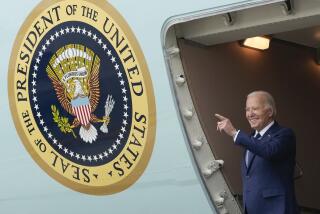There’s Politics, and There’s Party Politics
- Share via
Textbooks on American government usually present the reader with a list of the various roles and functions of the president of the United States. Included in almost all of them is the president’s role as titular head of his party. I have always felt that the term “titular” ought to be set off in italics so as to suggest the irony with which this presidential duty should be treated. The fact is that most presidents are bored by tedious discussions of internal party matters and regard great debates over political philosophy to be, at best, a waste of time and, if not properly disciplined, downright dangerous.
For those reasons, perhaps, President Clinton has delegated to Hillary Rodham Clinton the job of convening a series of meetings of representatives of various factions associated with the party to ponder the politics of the year 2000 and beyond. In the old Soviet Union, the job of doctrinal watchdog was given to a dreary party hack named Mikhail Suslov. Mrs. Clinton seems to have drawn the unenviable assignment of being the Democrats’ Suslov.
Professional party people are a pretty sorry lot. Both Democratic and Republican committees in Washington tend to attract hangers-on like the characters who haunt union halls and are known, derisively, as “pork-choppers.” But there is also a large supporting cast of lobbyists and heads of think tanks and institutes associated with one party or the other whose job it is to stage occasional ideological Punch and Judy shows to attract the support of wealthy eccentrics who believe that serious political battles can be waged in the pages of newsletters and low-circulation magazines.
Mostly, this is a harmless activity--much like Civil War reenactments--and tends to keep many people who live inside the Beltway in nice vacation homes and good haircuts. But presidents come to office with personal agendas that may be dramatically at variance with the priorities of the party and its Washington establishment. Even though presidential nominees usually dictate their party’s platform at the national conventions, the winners quickly attend to paying off the constituencies that help elect them rather than to the concerns of party professionals.
Nothing irritates presidents more than having to mollify those who assert their guardianship of what they deem to be the true precepts of the party. President Kennedy was driven to distraction by Eleanor Roosevelt and members of the Americans for Democratic Action who looked upon Kennedy as a kind of usurper of the rightful place of two-time nominee Adlai Stevenson. Enjoying only a narrow margin in the House of Representatives, especially on touchy issues such as civil rights, Kennedy was regarded by party liberals as a trimmer who compromised basic party principles in order to cut deals with influential Republicans. In like manner, Bill Clinton leaned heavily on GOP members for support on trade liberalization bills that many Democrats saw as excessively friendly to big business. The world economy might not have been high on the agenda of many long-time Democrats, but it was a personal preoccupation of Clinton’s.
Party loyalty, for most officeholders, is more a function of convenience than of conviction. Presidents needing opposition support on votes they care about will traffic with the enemy and dump their party allies, as Clinton did on several tax and trade policy votes. Likewise, congressional candidates of the party of an unpopular president will shun him as if he were the carrier of a dread pathogen, as Democrats did to Clinton in 1994.
Seminars on party principles and how best to hew to them always have a strong aroma of unreality about them. More ominously, they can also send up the faint but unmistakable smell of singed flesh, as zealots on all sides prepare the stakes for apostates and unbelievers. Unlike the salon atmosphere of the Clintons’ beloved Renaissance Weekends, discussions of party doctrines can more closely resemble the Council of Trent or some other medieval heresy hunt.
The hope among some Democrats is that the much-heralded “third way,” a kind of compassionate capitalism, will serve to bridge the gap between various party factions and that the party will be spared fratricide in 2000. But however much Vice President Al Gore and Rep. Richard Gephardt and other contenders might concede the desirability of a pleasing affirmation of party principles, they both know that the way to the nomination and victory in 2000 is organization and fund-raising, not seminars.
More to Read
Get the L.A. Times Politics newsletter
Deeply reported insights into legislation, politics and policy from Sacramento, Washington and beyond. In your inbox twice per week.
You may occasionally receive promotional content from the Los Angeles Times.










